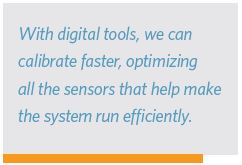Digital Tools Enable Service Products
By Joseph Farah

Since its founding in 1967, Applied Materials has been developing technologies that enable customers to build the world’s most-advanced semiconductor devices. In turn, these devices have fueled an explosion of electronic products and capabilities, from phones and games to social media. Today, digital systems and devices are changing how we live and work, including the ways in which Applied can now support customers.
Increasingly, Applied is investing in digital tools and services that enable us to reach across time zones and geographic boundaries to serve customers better. Digital tools help us optimize the performance of production tools in customer fabs by allowing us to predict, respond to, and resolve problems faster and more cost-effectively than ever before.
TECHNOLOGY: DIGITAL TOOLS
Underpinning our service product offerings is the deep expertise captured in our systems knowledge base. This knowledge base comprises a broad collection of machine-performance information and best-known methods (BKMs) gathered over many years and across all platforms in the Applied Materials product line. Our BKMs are designed for process and hardware setups, as well as for maintenance methods, to keep customers’ tools functioning at optimum performance.
The Applied Global Services (AGS) organization supports tools installed at customer sites worldwide. Our support spans the entire tool life cycle, including installation, warranty, and post-warranty Applied service agreements or Applied OnDemand™ parts programs. In each of these phases, Applied’s customer engineers (CEs) use a variety of digital tools to support customers.
Digital tools are not physical products. They are advanced analytics based on the

several thousand sensors on Applied production equipment that communicate to the servers installed at customer sites to collect and analyze system-performance data. This highly secure data is then used to recover systems from idle states, predict failures, and analyze recipe performance. In conjunction with existing customer data, the information collected from digital tools allows Applied to perform sophisticated analytics that help maintain system performance and detect excursions.
Applied builds its digital tools by picking a key subset of sensors critical to the customer’s process, then extracting data from those sensors. This data forms the basis of what Applied delivers through its systems support offerings, which include Standard, Managed, or Performance service agreements.
Our approach is proving to be successful with customers, with many thousands of tools now maintained under these service agreements, and the numbers are growing. With digital tools, we can calibrate faster, optimizing all the sensors that help make the system run efficiently. Reprinted from Summer 2020 Edition 2 monthly. Customers recognize that Applied’s unique knowledge of its tools, and its ability to create BKMs derived in part by analyzing sensor data, give Applied valuable insights in how to most efficiently and effectively maintain and service production tools.
New System Installs
Digital tools also play an important role when new or refurbished systems are installed in a fab and the customer needs to ramp to volume production as fast as possible. Applied personnel use digital tools to fingerprint the hardware, rapidly calibrate it, and then quickly optimize the system to run at peak efficiency.
This process of calibrating and rechecking a system used to take up to two months, because every single sensor had to be checked, regulated, and rechecked to make sure the tool met the process recipe. With digital tools, we can calibrate faster, optimizing all the sensors that help make the system run efficiently. What used to take months can now be accomplished in a week or two, accelerating fab ramps.
Remote Connectivity
Applied Materials service agreements normally involve placing a server at the customer’s fab to gather data on tool performance. Access to the server and tool data is fully controlled by the customer in order to maintain data security and protect their IP.
An even wider level of support is available as an option through Applied’s Remote Connectivity program, which customers can add to their service agreements. With this service offering, customers remain in control of their data, but allow local service teams to engage remote Applied Materials service experts and resources from around the globe day and night, 365 days a year. These experts are identified and authorized at the beginning of the service agreement to provide specialized support for down systems and other critical issues using Applied’s portfolio of digital tools. If a customer chooses not to participate in the Remote Connectivity program, Applied CEs can still connect with them locally to troubleshoot tool data and resolve the problem.
It is important to note that the security for remote connectivity is controlled by the customer and, in many cases, third-party security providers. For example, Applied is not responsible for the passwords; the customer is responsible for providing access to remote connectivity of the system.
IMPROVED SYSTEM PERFORMANCE, REDUCED COST OF OPERATION
When utilized by Applied CEs and service experts, our digital tool portfolio helps customers improve their system performance and reduce their cost of operation by:
- Fingerprinting the hardware: As noted above, digital tools, as components of a service agreement, help accelerate fab ramps by optimizing and monitoring critical sensors.
- Improving troubleshooting efficiency: digital tools support corrective and preventive maintenance, including software optimization.
- Co-optimizing daily WIP: digital tools improve system output and monitor fleet health through a site- and tool-specific dashboard.
- Preventing wafer scrap: digital tools include building excursion-detection models to monitor process steps and hardware.
These four capabilities enable better system performance and have been proven to improve process and maintenance methods. Importantly, they have resulted in improved parts performance, extending the life of some parts, and reducing the overall cost of ownership for our most-advanced systems and technologies.
Just to be clear, customers who do not have service agreements can still purchase spare parts through the Applied OnDemand parts program. And if a customer’s own engineers cannot solve a problem, an Applied CE can provide OnDemand system support, either in person or by phone, on an hourly cost basis.
OnDemand support does not include Applied’s portfolio of digital tools. These are available only through Applied Managed Service™ agreements, which include tool uptime targets; or our Applied Performance Service™ agreements, which include agreed upon wafer yield targets. Companies that sign Managed or Performance service agreements are supported using Applied’s digital tools, though the customer can decide whether to include our Remote Connectivity program in the agreement.
In summary, using digital tools has significantly enhanced Applied Materials’ service delivery and ability to optimize system performance. And we are continuing to develop new service technologies, including highly efficient remote capabilities that help customers get the performance they need from their Applied Materials equipment, whenever and wherever they need it.
To learn more about our Customer Support programs, please call the Applied Materials Global Customer Contact Center at 1-800-468-8888 (1-800-HOT-TTTT) and a local Field Service representative will contact you promptly. You can also reach us by email at www.GCC_AMNA@amat.com, or online at www.appliedmaterials.com/customer-portal.
For further information contact joseph_farah@amat.com

Joseph Farah, Director of Product Line Management
